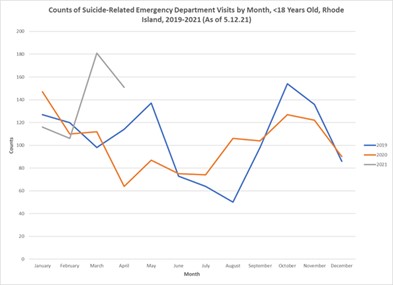

Is your Home Suicide Proof? Download Here >>
Over-the-Counter Does Not Mean On-the-Counter Download Here >>
Data from the Department of Health show a large increase in numbers of suicide-related ED visits amongst children younger than 18 for March and April 2021 when compared to previous years. As mentioned above, many of the attempts made by teens are by ingestion of household medications.

For more information, here are some great websites with additional resources:
Providence Center crisis clinicians provide 24/7 telephone assistance for adults and children in crisis. Providence Center clinicians will triage the situation and recommend options for treatment.
This line also serves to provide consultation services to other providers seeking guidance or resources in relation to a patient in their care or their general practice. Providence Center clinicians can advise on topics such as discerning level of risk, de-escalation techniques, safety planning, and navigating community resources.
Copyright © 2025 Care New England Health System